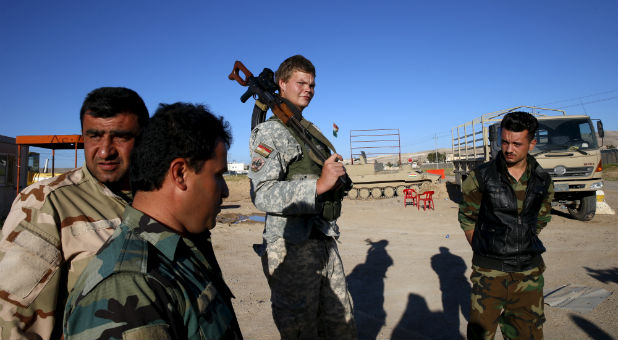How President Obama Plans to Engage the Islamic State
President Barack Obama announced on Monday the biggest expansion of U.S. ground troops in Syria since the civil war there began, saying he would dispatch an extra 250 special forces soldiers to build on successes against Islamic State.
The new deployment will increase U.S. forces in Syria to about 300. The decision, announced by Obama in Germany at the end of a six-day foreign tour, appears reflects growing confidence in the ability of U.S.-backed forces to claw back territory from the hardline Sunni Islamist group.
“Given the success, I’ve approved the deployment of up to 250 additional U.S. personnel inSyria, including special forces to keep up this momentum,” Obama said in a speech at a trade fair in the northern city of Hanover, the last stop on a trip that has taken him to Saudi Arabia and Britain.
“They’re not going to be leading the fight on the ground, but they will be essential in providing the training and assisting local forces as they continue to drive ISIL back,” he added.
With German Chancellor Angela Merkel sitting in the audience, Obama also urged Europe and NATO allies to do more in the fight against Islamic State, with is also known as ISIS or ISIL.
The group controls the cities of Mosul in Iraq and Raqqa in Syria and a swathe of territory in between, and has proven a potent threat abroad, claiming responsibility for major attacks in Paris in November and Brussels in March.
“Even as European countries make important contributions against ISIL, Europe, including NATO, can still do more,” Obama said ahead of talks later in the day with Merkel and the leaders of Britain, France and Italy.
“In Syria and Iraq we need more nations contributing to their campaign. We need more nations contributing trainers to help build up local forces in Iraq. We need more nations to contribute economic assistance to Iraq so it can stabilize liberated areas and break the cycle of violent extremism so that ISIL cannot come back,” he said.
ADDING TROOPS
Obama pledged to wind down wars in the Middle East when he was first elected in 2008. But in the latter part of his presidency he has found it necessary to keep or add troops to help with conflicts in Iraq, Afghanistan and Syria, where a five-year civil war has killed at least 250,000 people.
Last year he sent 50 U.S. special operations forces to Syria in what U.S. officials described as a “counterterrorism” mission rather than an effort to tip the scales in the war.
Deputy National Security Adviser Ben Rhodes, briefing reporters before Obama spoke, said U.S. forces “are not being sent there on a combat mission”.
In Iraq, Islamic State has been pulling back since December when it lost Ramadi, the capital of the western province of Anbar. In Syria, the jihadist fighters have been pushed from the strategic city of Palmyra by Russian-backed Syrian government forces.
The Pentagon announced last week that about 200 more troops would be deployed to Iraq, mainly to advise Iraqi troops fighting Islamic State.
Since U.S.-backed forces recaptured the strategic Syrian town of al-Shadadi in late February, a growing number of Arab fighters in Syria have offered to join the fight against the group, U.S. officials told Reuters in early April.
Syria was a major theme in Sunday talks between Obama and Merkel. The German leader had just returned from a trip to Turkey to see refugee camps along the border.
The European Union has grappled with the flood of about a million migrants last year, most fleeing the Syria crisis. Merkel pushed her EU partners to accept refugees, and recently hammered out a deal with Turkey to stop the migrant flow.
After meeting with Merkel for about 90 minutes, Obama told reporters on Sunday that he was “deeply concerned” about a surge in violence in Syria, where government forces have stepped up bombing of rebel-held areas around the strategic city of Aleppo. {eoa}
© 2016 Thomson Reuters. All rights reserved.















































